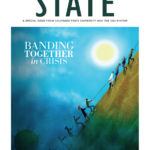Raegan Petch is starting her senior year at CSU in Fort Collins. Photo: Ben P. Ward / Colorado State University
When news of the coronavirus pandemic broke, I was actually pretty excited.
I began hearing about the virus in early January, and my interest increased from there. The implications of a newly recognized viral disease are astounding, especially to a student who is passionate about microbiology and infectious disease. I was excited to see how the novel coronavirus would be studied and understood by scientists, and I followed outbreak news religiously. At the start of the Spring 2020 semester, I checked the daily situation report from the World Health Organization while waiting for my microbiology classes to begin, and many of our lab meetings became discussions about the novel coronavirus.
I’m a senior majoring in microbiology at Colorado State University. As an undergraduate researcher, I’m studying the spillover of infectious disease from one species to another – the mechanism that most likely led to emergence of COVID-19. A challenge for researchers in our field lies in discovering the route of transmission among species. This is essential to predicting future outbreaks, to understanding impacts on species, and to finding treatments and cures.
My interest in disease transmission was piqued in high school, when a substitute teacher showed a documentary about HIV. Research indicates that HIV emerged in humans in West Africa after they came into contact with a related virus in primates while hunting the animals for meat. Since then, my curiosity has grown, and I’ve focused on understanding other diseases introduced to humans from animal reservoirs, including Ebola virus disease, Middle East Respiratory Syndrome, and, of course, COVID-19, which likely began in bats. The potential effects of disease transmission between species are fascinating because they often have severe impacts on the novel host, creating complex scientific and medical challenges.
Viral transmission to new hosts is the focus of my undergraduate research in Dr. Sue VandeWoude’s lab. I started my freshman year as a research assistant. As I progressed, I had the opportunity to lead my own project, studying the transmission of feline leukemia virus, or FeLV, from domestic cats to pumas. I am extremely excited about the project, and it closely reflects my goal of studying disease spillover.
When the pandemic hit the United States in March, all of our lives were turned upside down. For me, it was hard to be away from the lab for three months, since I couldn’t make progress on my research or my senior honors thesis. I was in the second half of my junior year and was finally in the most challenging classes of my major. I was disappointed that we weren’t able to finish our classes the same way. I had been especially excited about my academic labs, domestic animal anatomy and medical bacteriology. Like countless other people, I canceled or postponed many plans. I had planned to be at Cornell University for additional research this summer, and I was scheduled to present my work on FeLV at several scientific conferences, including one in Spain.
Even with all the uncertainties and losses, the pandemic presents a unique opportunity for scientists to save lives. For many students, myself included, the crisis has initiated or deepened a passion for science and academic research. My earlier education about outbreaks was definitely intriguing, but the pandemic of 2020 is a tangible example of the field I’m studying and is the first outbreak to profoundly affect my life. The life-changing circumstances have motivated me, and I’m excited to work to predict and prevent future outbreaks in an effort to help people all over the world.
Raegan Petch is a microbiology major and an undergraduate infectious disease researcher at Colorado State University. She is a Goldwater Scholar and an Astronaut Scholar in the CSU Honors Program. After graduation, Petch hopes to enter a combined D.V.M./Ph.D. program to be trained as a veterinary researcher.





